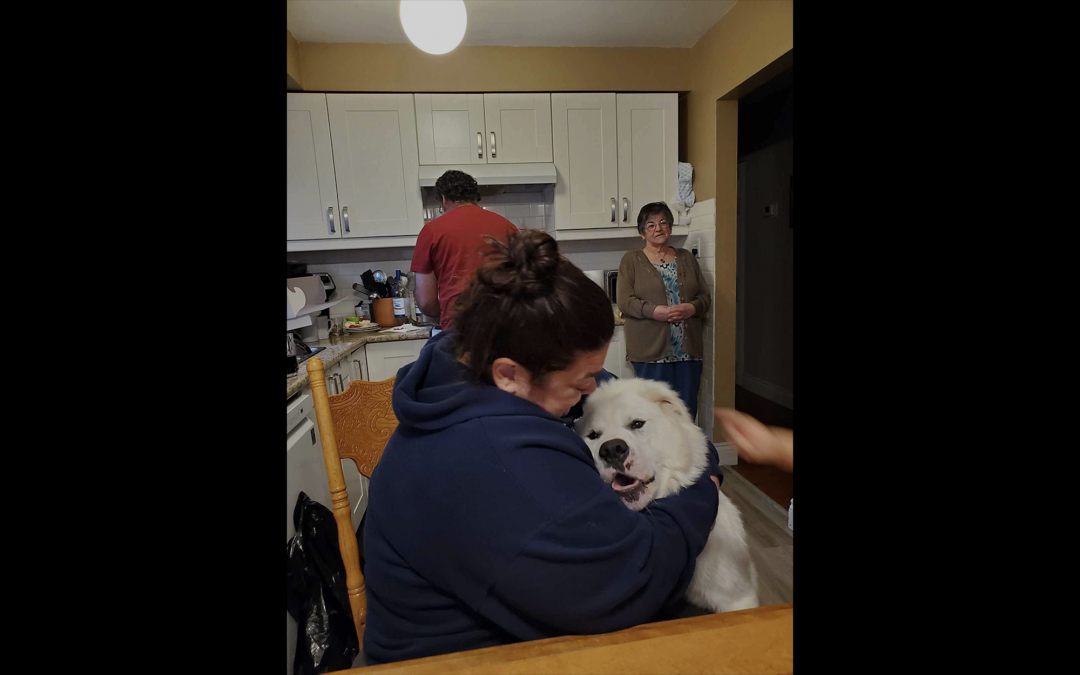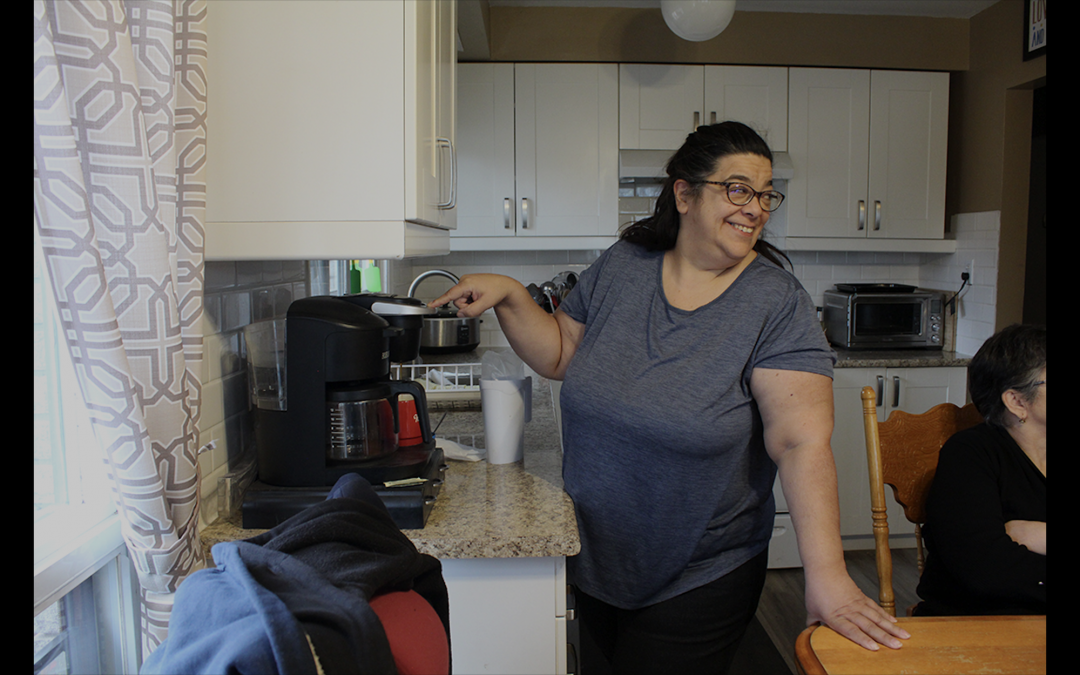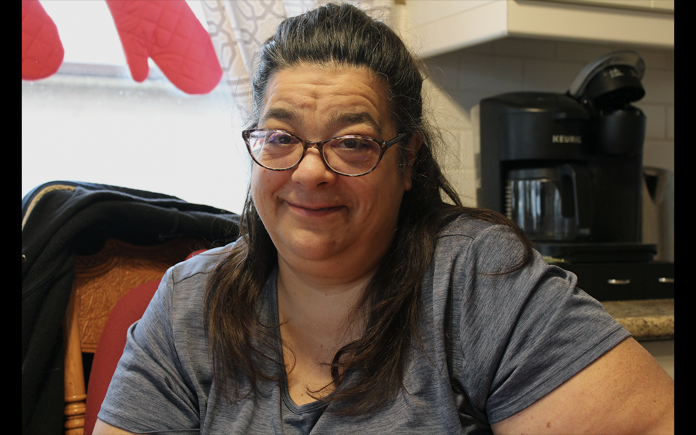It all started with a bark—a frantic, insistent bark from Walter, the McMullen family dog. The bark cut through the stillness of the family home. When Lori McMullen’s niece rushed to check on her, she found her aunt in her room, unresponsive.
“All I remember that morning was I opened my eyes because Walter touched my leg, I got up and I fell,” said Lori McMullen.
McMullen’s life changed dramatically when she experienced a sudden, unexplained seizure that left her unable to work, drive, and maintain the independence she had always known.
For the last three years, McMullen, 52, has struggled with the emotional, physical and psychological impacts of a condition that doctors still can’t explain.
According to Epilepsy Ontario, one in 100 Canadians have epilepsy. It mostly affects seniors and young children, though it can develop at any age.
Her journey, marked by fear, loss and resilience, is shaped by the uncertainty of her seizures and the support of her family, friends and loyal dog, Walter, who has become her constant companion and protector.

Image credit: Kevin McMullen
McMullen’s bond with her dog has only deepened as a result of the seizures. Walter, a constant presence in her life, offers both comfort and protection. His loyalty is undeniable—he’s always by her side and often sleeps with her, sensing when something isn’t right.
That bond would proved crucial during McMullen’s most recent seizure on November 7th, last year. It was by far the longest she had ever experienced. “So that one was the longest one, I believe because that’s when the fire department had to take me out,” she said.
When the seizure struck, her world went dark.
“I didn’t know until I woke up at the hospital and that’s when I started asking questions.”
That wasn’t the first time she experienced a life-threatening seizure.
The first one had come out of nowhere, and it left her shaken. As a dedicated worker at Dollarama, McMullen had always been in control of her life. There was no history of seizures in her family, and she had never experienced one herself—until 2021.
The sudden and unexplained event was terrifying, not just because of the physical toll it took, but because it led to her losing her job and her ability to drive. Her life, once filled with routine and independence, was suddenly thrown into chaos.
“Okay the first seizure, I did not know it was coming,” she said. “I was just at work, having a meeting, sipping coffee, and then had the seizure.”
The sudden onset of seizures had a profound impact on her life. She was forced to give up her job due to health concerns and, shortly after, her driver’s license was revoked because of the safety risks posed by her condition.
“Asking for people to drive you, that’s not my type of thing, but you gotta do it in life,” she said.
Doctors still don’t know what’s causing her seizures—tests come back normal, and there’s no history of seizures in her family.
“They don’t really know what it’s causing. Something in the brain? Stress? They don’t know,” McMullen said.
Chelsea Kerstens, the Executive Director of Epilepsy Durham Region, said epilepsy is unpredictable. Kerstens, who also gets seizures, said the sudden onset can disrupt a person’s life in ways that are not just physical but also deeply emotional and psychological.
“There’s a component of feeling very isolated,” said Kerstens.
Kerstens’ own journey with epilepsy began when she was just 14 years old, though her family didn’t initially recognize it as a seizure. But it wasn’t until about four years later that she received an official diagnosis. By the time she was 18, she began taking medication to manage them.
For many, the path to a diagnosis is long, as Kerstens explained: “From the first seizure to appropriate seizure management in epilepsy it is approximately 10-20 years.”
Despite her own frequent seizures, Kerstens emphasized that people with epilepsy often face the challenge of feeling like they’re going through this alone. However, there are effective treatments available, including brain surgery, medication, and even a Vagus Nerve Stimulation (VNS) device, which delivers electrical impulses to the nerve that carry messages to the brain, helping to prevent or shorten the duration of seizures.
Kerstens said to help those presenting with a seizure, alert emergency services.
“While waiting for first responders, you want to place something soft under their head, undo anything that is tight so you can open their airways, roll them onto their side and be sure to keep them still,” she said, and added not to restrain anybody during a seizure, but rather let the seizure run its course.
“The best piece of advice is to not be afraid to seek out support because it’s hard to feel isolated,” she said.
Kerstens’ work and personal experience with epilepsy serve as a reminder that even in the face of uncertainty, connection and understanding can provide hope and resilience.
Her story, like McMullen’s, goes beyond the seizures themselves. It is a story of losing control and grappling with the profound effects on one’s independence—an emotional and psychological journey as challenging as the physical symptoms.
For McMullen, one of the hardest blows was losing her driver’s license. “It was okay at first, but not being able to drive, it gets more depressing,” she said. “You see your car sitting in the driveway, and you just want to jump in and go, but you can’t.”
For someone who is used to working and being active, staying at home every day has been a difficult adjustment. “Like, to me, sitting at home, I try to do the best I can, do stuff around the house. But not going back to work, it really sucks,” she said.

For McMullen, the emotional and psychological toll has been just as devastating as the physical side effects of the seizures.
“I’m gonna be honest with you. You do forget things. Sometimes I go to my room to get something, and I have to go backwards to remember,” she said.
McMullen said the seizures were unpredictable. She had no idea when or where they would strike, and the aftermath left her feeling lost.
“Sleep was the worst, because you never know if you’re going to wake up,” she said. The fear of falling asleep and not waking up again was ever-present, a constant undercurrent of anxiety that shaped her day-to-day life.
Her relationships with family and friends have changed as well. Some friends have drifted away, unsure how to relate to her new reality. “Friends, certain ones, I still have.” she said. “Family, they’re there. Some of them call,” she added.
Her mother, Lidia DiVona, has had to adjust to this new reality, watching over her daughter to make sure she’s safe, especially when the seizures come without warning. “I can’t leave her alone, it’s driving me crazy, because I have to be with her all the time,” DiVona said.
McMullen’s journey is a story of survival, resilience, and determination in the midst of an unpredictable and life-altering condition. Although the future remains uncertain, she continues to approach each day with courage, supported by her loyal dog, family, and friends who have remained by her side through it all.




